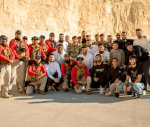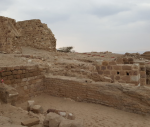You are here
Results needed before resistance mounts
Oct 02,2014 - Last updated at Oct 02,2014
The US-led coalition to fight the so-called Islamic State was formed and the war against it started.
As some members of the coalition who are at the forefront of action are facing some resistance to the war at home, it is crucial for the war against IS to yield quick results in order to quell the popular resistance and prevent it from escalating.
Fighting IS will take time.
There is, first, the military front with its complexities. Air bombardment is a must, but without boots on the ground, the war cannot be as effective.
Members of the coalition are nearly all reluctant to send troops. They count on retraining the Iraqi army, giving more support to Free Syrian Army, and lending further backing to the Kurdish peshmerga.
Assuming this will be done efficiently, it will take time.
There is, second, the need to destroy IS’ basic infrastructure, such as the command and communication centres, oil facilities, main routes, etc. And, third, there is the matter of backing, financing and recruitment of IS fighters.
The last is of particular importance, though it is perhaps the most difficult to handle.
IS was at the start directly and indirectly supported, for all kinds of reasons, by powerful countries in the region and beyond, including some members of the coalition. The support was in the form of funds, logistics and fighters.
Now that IS is perceived as a direct threat even to those who supported it initially, shutting down all venues of support will not be easy — assuming that all players are now genuine about it.
There are daily reports about wealthy organisations and individuals in some countries who still channel funds to IS and who still provide it with fighters.
The prevention of potential IS recruits from Indonesia, in the east, to the US, in the west, and from Russia, in the north, to Australia, in the south, is a daunting task. All this, and more, one understands.
Nevertheless, there is resistance to the coalition and to the war on IS. That is not so much out of sympathy with IS, even though there are some hardline Salafists and other Islamists who, unfortunately, do sympathise with and support IS.
Rather, it is for two main reasons. One has to do with casting doubt on America’s true intentions.
There are people in our part of the world, influenced by the great amount of literature written on the subject and by a long tradition of suspicion of American motives, who feel that America uses IS in order to promote instability in the region in order to keep itself in it for prolonged access to the region’s oil and gas, for selling arms to wealthy Gulf countries, for countering Russia’s and China’s interests and ambitions, etc.
The other, slightly more plausible, has to do with America’s ability to defeat and uproot terror.
People who subscribe to this position always cite the examples of Afghanistan, Iraq and Syria. Whenever America wages war against terror, terror grows and spreads.
It is therefore absolutely crucial that the war against IS succeed. More crucially even, it should yield results, and very soon.
So far, there have been reports about sporadic bombings that destroy IS vehicles, hit oil and other facilities and kill fighters, but nothing dramatic or spectacular.
In fact, IS is not only not retreating, it is gaining ground in some areas.
This is troubling for those who support the idea of war and want to see IS wiped out of existence.
Therefore, there is an urgent need for some resounding success or some more concrete and convincing results. If these do not materialise, the resistance to both coalition and war will mount and perhaps turn into resentment and opposition.













